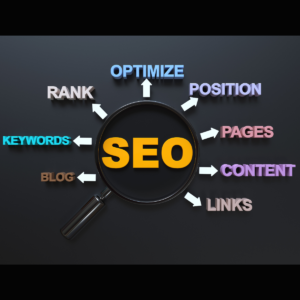
The Ultimate Solution for Busy Entrepreneurs

Struggling to manage your website while running your business? We've got you covered with a completely hands-off small business website for just $99 a month!
Ready to take the next step? Click here to schedule your 30-minute consultation and make your business life easier than ever.
In today’s competitive business landscape, marketing plays a crucial role in the success of small enterprises. Effective marketing strategies can help small businesses stand out, attract customers, and build brand loyalty. However, with the ever-evolving marketing landscape, small business owners must stay informed about the latest trends and techniques. This comprehensive guide explores the critical aspects of small business marketing, providing you with all the knowledge you need to create and implement successful marketing strategies. From setting clear goals and understanding your target audience to choosing the right marketing channels and analyzing results, this article covers everything you need to know to thrive in today’s competitive marketplace.

Understanding Small Business Marketing
What is Small Business Marketing?
Small business marketing refers to the activities and strategies that small businesses undertake to promote their offerings to a targeted audience. Unlike large corporations with substantial marketing budgets, small businesses often have limited resources, making it crucial to invest in cost-effective and efficient marketing efforts.
The average cost of marketing for small companies varies widely depending on the industry, location, and specific marketing strategies employed. However, a general recommendation is to allocate around 5-10% of total revenue to marketing.
Transform Your Business, Transform Your Life

Why Choose Host SMB Limited?
World-Class Design Meets Functionality
We don't just build websites; we create experiences. Our team of seasoned professionals designs custom, responsive websites optimized for both mobile and desktop. Your small business is unique; your website should be too. We have packages starting at $99 a month for all of your website needs taken care of.SEO Ready and Built for Growth
A beautiful website is just a start. We lay the foundation for your online success by implementing proven SEO strategies that make your site easily discoverable.The Importance of Small Business Marketing
Effective marketing is the lifeblood of any small business. Here’s why it’s crucial:
Visibility: Marketing helps your business get noticed in a crowded marketplace. It ensures that potential customers are aware of your products or services and can consider them when making purchasing decisions.
Customer Acquisition: Marketing is essential for attracting new customers and clients. By showcasing the unique value and benefits of your offerings, you can convince potential customers to choose your business over competitors.
Brand Building: Marketing helps establish and strengthen your brand identity. It allows you to create a distinct and recognizable image that customers can associate with the quality, values, and personality of your business.
Competitive Edge: Effective marketing enables small businesses to compete with larger competitors. It provides an opportunity to differentiate yourself and showcase what makes your business special, even against well-established brands.
Revenue Generation: Ultimately, the goal of marketing is to drive sales and revenue. By reaching and persuading the right audience, you can generate more leads, convert them into paying customers, and increase your overall profitability.
Creating a Small Business Marketing Strategy
Setting Clear Goals
Before diving into marketing activities, it’s essential to define your objectives. What do you want to achieve through marketing? Setting clear goals helps you stay focused and measure the success of your efforts.
Common marketing goals for small businesses include:
- Increasing sales and revenue
- Expanding the customer base
- Improving brand awareness and recognition
- Launching a new product or service
To ensure your goals are effective, make sure they are specific, measurable, attainable, relevant, and time-bound (SMART). This approach allows you to set realistic targets and track your progress.
Knowing Your Target Audience
Understanding your target audience is critical for crafting effective marketing messages. Conduct market research to identify your ideal customer’s demographics, preferences, and pain points.
By gathering this information, you can tailor your marketing efforts to resonate with your audience and address their specific needs. This personalization increases the likelihood of attracting and retaining customers.
Choosing the Right Marketing Channels
There are various marketing channels available, both online and offline. It’s important for small businesses to choose channels that align with their goals and target audience.
Some common marketing channels include:
- Social Media Marketing: Ideal for reaching a broad online audience and engaging with potential customers through platforms like Facebook, Instagram, and Twitter.
- Content Marketing: Useful for educating and engaging potential customers through valuable and informative content such as blog posts, videos, and infographics.
- Email Marketing: Effective for nurturing leads, building relationships with existing customers, and delivering personalized content and offers.
- Search Engine Optimization (SEO): Helps improve your online visibility by optimizing your website’s content, structure, and backlinks to rank higher in search engine results.
- Pay-Per-Click (PPC) Advertising: Provides targeted online advertising opportunities through platforms like Google Ads and Facebook Ads.
- Local Marketing: Targets customers in your geographical area through tactics like local SEO, direct mail marketing, and community events.
- Networking and Events: Valuable for building local connections and generating word-of-mouth referrals through attending industry conferences, trade shows, and networking events.
Choosing the right marketing channels requires careful consideration of your audience’s preferences, your budget, and the specific goals you’ve set for your small business.
Crafting Compelling Content
Content is at the heart of modern marketing. It allows you to engage and connect with your audience. Whether it’s blog posts, videos, social media updates, or email newsletters, high-quality content helps you showcase your expertise and build trust with potential customers.
When crafting content, keep in mind that it should be informative, relevant, and engaging. It should address the needs and interests of your target clients, provide valuable insights or solutions, and ultimately encourage them to take action, such as making a purchase or contacting your business.
Leveraging Social Media
Social media platforms provide valuable opportunities for small businesses to engage with their audience. Creating a social media strategy that includes regular updates, engagement with followers, and targeted advertising can greatly enhance your marketing efforts.
When using social media, it’s important to choose the platforms that are most relevant to your target audience. Each social media platform has its own unique user base and characteristics. For example, Facebook is popular among a broad range of demographics, while Instagram is known for its visual focus and younger user base.
By understanding the preferences and habits of your target audience, you can choose the right social media platforms and tailor your content to maximize engagement and reach.
Email Marketing
Email marketing is a cost-effective way to nurture and maintain relationships with your existing customers. Building an email list allows you to deliver personalized content, exclusive offers, and important updates directly to your subscribers’ inboxes.
To make the most of email marketing, consider segmenting your subscribers based on their preferences, behavior, or demographics. This allows you to send targeted emails that are highly relevant to each group, increasing the chances of engagement and conversion.
Remember to always provide value in your emails. Avoid being overly promotional and instead focus on delivering content that educates, entertains, or solves a problem for your subscribers. Engaging subject lines and clear calls-to-action can also improve the effectiveness of your email marketing campaigns.
Search Engine Optimization (SEO)
Search Engine Optimization (SEO) is the process of optimizing your website and content to rank higher in organic search engine results. By improving your online visibility, you can attract more organic traffic and potential customers to your website.
To improve your SEO, consider the following strategies:
- Conduct keyword research to identify relevant and valuable keywords that your target audience is using to search for products or services.
- Optimize your website’s structure and content to ensure it is easily navigable and provides a positive user experience.
- Create high-quality and relevant content that incorporates your target keywords and meets the needs of your audience.
- Build high-quality backlinks from reputable websites to increase your website’s authority and credibility.
SEO is an ongoing process that requires monitoring and adjustment based on changes in search engine algorithms and user behavior. Regularly analyzing your website’s analytics and performance metrics can provide valuable insights into the effectiveness of your SEO efforts.
Analyzing and Measuring Results
Regularly monitoring and measuring the results of your marketing campaigns is crucial for refining and improving your strategies. Tracking key performance indicators (KPIs) allows you to assess the success of your marketing efforts and make data-driven decisions.
Common KPIs to consider when analyzing your marketing results include:
- Website Traffic: Monitor the number of visitors to your website, as well as the sources of traffic (e.g., organic search, social media, referrals).
- Conversion Rates: Track the percentage of website visitors who take a desired action, such as making a purchase or filling out a contact form.
- Social Media Engagement: Measure the level of interaction and engagement with your social media posts, including likes, comments, and shares.
- Email Open Rates: Assess the percentage of subscribers who open your emails, indicating the effectiveness of your subject lines and email content.
- Sales and Revenue: Calculate the revenue generated from your marketing campaigns and compare it to the costs to determine the return on investment (ROI).
Analyzing your results allows you to identify what’s working and what needs improvement. By identifying patterns and trends, you can optimize your marketing efforts, allocate resources more effectively, and continually refine your strategies.
Budgeting for Small Business Marketing
Small businesses often have limited budgets, so it’s crucial to allocate resources wisely and prioritize cost-effective strategies that align with your goals. Here are some tips for budgeting for small business marketing:
- Determine the amount of money you can realistically spend on marketing without jeopardizing other areas of your business.
- Research the costs associated with different marketing tactics to understand what is feasible for your budget.
- Prioritize the strategies that have the potential to deliver the highest return on investment (ROI) based on your specific goals and target audience.
- Consider experimenting with low-cost or free marketing tactics, such as content marketing, social media, and email marketing, before investing in expensive advertising campaigns.
- Continuously track and measure the results of your marketing efforts to ensure you’re getting the most value for your money and adjust your budget allocation accordingly.
By carefully managing your marketing budget and evaluating the effectiveness of each strategy, you can make informed decisions that maximize the impact of your marketing efforts.

Adapting to the Digital Age
The Importance of an Online Presence
In today’s digital age, having a solid online presence is non-negotiable for small businesses. Your online presence serves as a digital storefront where potential customers can learn more about your business offerings and make purchasing decisions.
A robust online presence helps you:
- Reach a wider audience: With the internet’s global reach, you can attract potential customers from various geographical locations.
- Build credibility and trust: A well-designed website, active social media profiles, and positive online reviews can instill confidence in potential customers and differentiate you from competitors.
- Provide convenience and accessibility: Customers can easily learn about your business, browse products or services, and contact you at their convenience.
- Engage and interact with customers: Social media platforms and online communities allow for real-time engagement and two-way communication with your audience.
To establish a strong online presence, consider the following:
- Create a user-friendly website that accurately represents your brand and offerings.
- Optimize your website for search engines to improve organic visibility and attract more traffic.
- Keep your website content fresh, relevant, and informative to engage visitors and encourage return visits.
- Maintain active social media profiles on platforms relevant to your target audience.
- Encourage satisfied customers to leave reviews on platforms like Google My Business and Yelp.
- Regularly monitor and respond to customer inquiries, comments, and reviews to demonstrate excellent customer service.
Mobile Optimization
With the majority of internet users accessing websites through mobile devices, ensuring your website is mobile-friendly is necessary. A responsive design enables your site to adapt to different screen sizes and provide a seamless user experience.
Benefits of mobile optimization include:
- Improved user experience: A mobile-friendly website makes it easier for users to navigate, read content, and interact with your business on their mobile devices.
- Higher search engine rankings: Search engines prioritize mobile-responsive websites in their mobile search results, leading to increased visibility and organic traffic.
- Enhanced customer satisfaction: By offering a mobile-friendly experience, you’re more likely to satisfy and retain mobile users, who make up a significant portion of your audience.
Ensure your website loads quickly on mobile devices, with easy-to-navigate menus, readable text, and responsive images and videos. Regularly test your website’s mobile responsiveness and make necessary adjustments to optimize the user experience.
Online Advertising
Online advertising provides small businesses with highly targeted and cost-effective marketing opportunities. By leveraging platforms like Google Ads and Facebook Ads, you can reach potential customers based on their demographics, interests, and online behavior.
Benefits of online advertising include:
- Precise targeting: Online advertising allows you to fine-tune your target audience and tailor your ads specifically to their characteristics and preferences.
- Measurable results: Online advertising platforms provide detailed analytics and reporting, allowing you to track the performance of your ads and calculate the return on investment (ROI).
- Cost control: You can set specific budgets for your online advertising campaigns, ensuring you don’t overspend or waste resources on ineffective ads.
- Flexibility and scalability: Online advertising offers various ad formats and customization options, enabling you to experiment, optimize, and scale your campaigns as needed.
To make the most of online advertising:
- Clearly define your advertising goals and target audience.
- Research and choose the most appropriate advertising platforms based on your objectives.
- Craft compelling ad copy and design eye-catching visuals.
- Continuously monitor and optimize your campaigns based on performance data.
- Regularly review and adjust your advertising budget to align with your business goals.
Staying Informed about Marketing Trends
The marketing landscape is constantly evolving, and staying informed about the latest trends and technologies is crucial for small businesses. By staying up-to-date, you can adapt your marketing strategies and remain competitive in your industry.
Here are some ways to stay informed about marketing trends:
- Attend industry conferences, seminars, and workshops to learn from industry experts and network with other professionals.
- Read marketing blogs, subscribe to industry newsletters, and follow influential marketers on social media platforms to access timely insights, tips, and best practices.
- Join online communities and participate in discussions to learn from others in your industry, ask questions, and share your experiences.
- Keep a close eye on competitors and industry leaders to see what marketing strategies and tactics they are using.
- Continuously educate yourself through online courses, webinars, and certifications to stay updated on the latest marketing techniques and technologies.
By actively engaging with the marketing community, you can evolve your strategies, discover new opportunities, and anticipate changes in consumer behavior and market dynamics.
E-commerce Opportunities
For small businesses that sell products, embracing e-commerce can open up new opportunities for growth and expansion. An online store allows you to reach a broader audience, generate sales outside regular business hours, and potentially reduce overhead costs associated with physical retail locations.
By leveraging e-commerce platforms and tools, small businesses can:
- Sell products nationally or even internationally, expanding their customer base beyond their local area.
- Offer a convenient and seamless buying experience, allowing customers to browse and purchase products anytime and from anywhere.
- Track customer data and behavior, gaining valuable insights into purchasing patterns, preferences, and opportunities for product development or marketing personalization.
When starting with e-commerce, consider choosing a reliable e-commerce platform that suits your business needs and budget. Invest in user-friendly website design, secure payment gateways, and efficient order fulfillment processes to ensure a positive customer experience.
Managing Online Reviews
Online reviews can significantly impact a small business’s reputation and influence potential customers’ purchasing decisions. Positive reviews can attract new customers and build trust, while negative reviews can harm your credibility and drive potential customers away. Managing online reviews effectively is crucial for maintaining a positive brand image.
Here are some tips for managing online reviews:
- Monitor online review platforms regularly, including Google My Business, Yelp, and social media platforms, to stay informed about what customers are saying about your business.
- Respond promptly and professionally to both positive and negative reviews. Express gratitude to satisfied customers and address any concerns or issues raised by dissatisfied customers.
- Use negative reviews as an opportunity to improve your products, services, or customer experience. Demonstrate your commitment to customer satisfaction through proactive problem-solving and resolution.
- Encourage satisfied customers to leave reviews by using personalized emails or social media engagement. Positive reviews can counterbalance negative ones and provide social proof of your business’s quality and reliability.
Remember that transparency, authenticity, and empathy are key when managing online reviews. Even negative reviews can be turned into opportunities for growth and improvement by showing dedication to customer satisfaction.
In conclusion, small business marketing is a dynamic and essential aspect of business success. By setting clear goals, understanding your audience, choosing the right marketing channels, and effectively managing your resources, you can create a marketing strategy that drives growth and fosters brand loyalty. Building and maintaining a robust online presence is crucial in the digital age, and staying adaptable and informed about marketing trends will help you remain competitive in your industry. With the right strategies, small businesses can thrive in today’s competitive marketplace.

Source: https://world.einnews.com/article/653804173/osU4jwjt-MYACrOI?ref=rss&ecode=N2CJUMlo4fYPjUID
Unlock the Future of Easy Business Management

Are you overwhelmed by website management tasks? Say no more. Experience the luxury of a hands-off small business website for just $99 a month!
Why wait? Click here to book your 30-minute consultation and simplify your business operations like never before.



